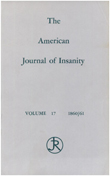Mood, major depression, and fluoxetine response in cigarette smokers
Abstract
OBJECTIVE: Two smoking cessation studies provided venues to 1) look for differences in affective symptoms between cigarette smokers with and without a history of major depression or other psychiatric diagnoses who were not currently depressed and 2) evaluate the efficacy of fluoxetine in ameliorating affective symptoms in smokers with a history of major depression but not currently depressed. METHOD: Part I: Three hundred sixty-eight smokers who enrolled in a smoking cessation treatment study completed baseline self-rating scales. The relationship between the scale scores and a history of major depression and other psychiatric diagnoses was examined. Part II: Thirty-nine smokers with a history of major depression were enrolled in a randomized, double-blind study that examined the utility of fluoxetine as an aid to smoking cessation. Self-rated scales were compared at baseline and after 3 weeks of medication treatment before the attempt to quit. RESULTS: A history of major depression had significant main effects across all scale scores; subjects with such a history rated themselves as more symptomatic. The effects of other psychiatric diagnoses were neither as pervasive nor as robust. There were no differences in baseline scores between the fluoxetine- and placebo-treated groups and no change within the placebo group after 3 weeks. There was significant improvement from baseline in several subscale scores for the group treated with fluoxetine. However, comparison of the score changes for the placebo and fluoxetine groups did not show a statistically significant difference, which limited the ability to conclude that active treatment was better than placebo. CONCLUSIONS: Subjects with a history of major depression, but without current affective illness, reported themselves to be more symptomatic than those without such-a history. Furthermore, in a group of smokers with a history of major depression, affective symptoms, without concurrent syndromal illness, may be ameliorated by treatment with fluoxetine.
Access content
To read the fulltext, please use one of the options below to sign in or purchase access.- Personal login
- Institutional Login
- Sign in via OpenAthens
- Register for access
-
Please login/register if you wish to pair your device and check access availability.
Not a subscriber?
PsychiatryOnline subscription options offer access to the DSM-5 library, books, journals, CME, and patient resources. This all-in-one virtual library provides psychiatrists and mental health professionals with key resources for diagnosis, treatment, research, and professional development.
Need more help? PsychiatryOnline Customer Service may be reached by emailing [email protected] or by calling 800-368-5777 (in the U.S.) or 703-907-7322 (outside the U.S.).



